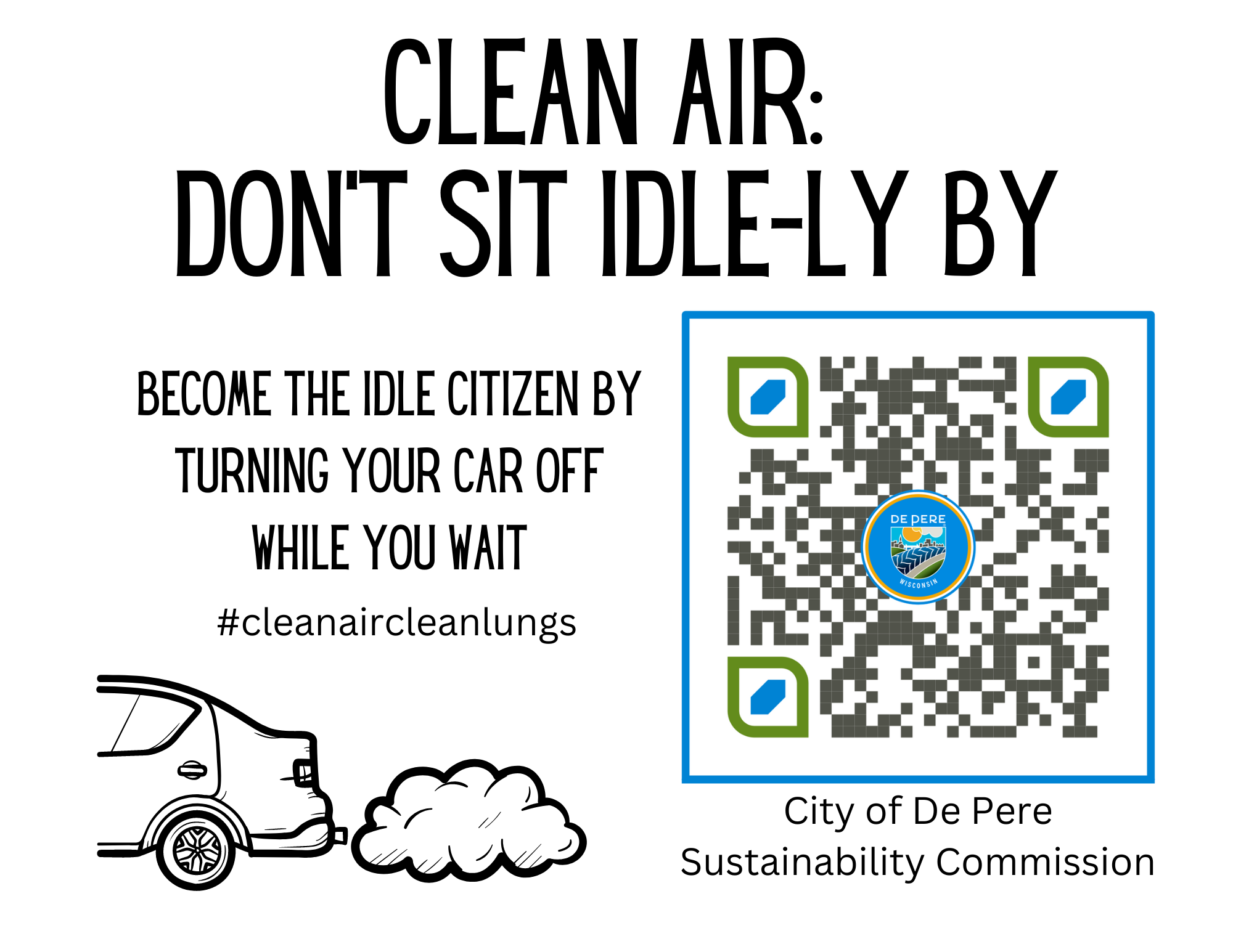Clean Air Initiative
CITY OF DE PERE SUSTAINABILITY COMMISSION:
CLEAN AIR INITIATIVE
The goal of the Clean Air Initiative is to reduce pollutants and harmful emissions in the air due to idling vehicles in our City. Idling vehicles release emissions that contain air toxins known to cause cancer and other serious health effects. These emissions also contribute to pollution and climate change. We’re asking the public to turn off engines rather than idling. We’re targeting school drop off/pick up zones as they have a high number of idling vehicles before and after school. This simple change will improve the air our children breathe, as well as the air quality in our schools, communities, and City!
Our schools face many challenges for providing clean and healthy indoor air and there are many impacts of poor air quality in schools; there are also many benefits to addressing indoor air quality in schools. Clean air is not only important at schools, but at our homes and work as well. To learn more about importance of clean air, check out the resources from the American Lung Association.
Why is it bad to idle vehicles?
According to the Environmental Protection Agency (EPA), idling vehicles contribute to air pollution and emit air toxins, which are pollutants known or suspected to cause cancer or other serious health effects. Monitoring at schools has shown elevated levels of benzene, formaldehyde, acetaldehyde, and other air toxins during the afternoon hour coinciding with parents picking up their children. Children's lungs are still developing, and when they are exposed to elevated levels of these pollutants, children have an increased risk of developing asthma, respiratory problems, and other adverse health effects. Limiting a vehicle's idling time can dramatically reduce these pollutants and children's exposure to them.
Education and Outreach Toolkits are available through the EPA and US Department of Energy for Idle Reduction and Clean Air for our schools, educators, residents, and community as a whole.
How can air quality be tested?
Indoor air quality sensors can be purchased through many retailers including Amazon, Grainger, Cole-Parmer, School Outlet, and others. In general, these sensors can range from $100 to $300 and can test many different parameters depending on what you are looking to track. Outdoor air quality sensors are also available, but are more costly.
Our schools can also have a free air quality assessment completed by the EPA.
What can you do if your air quality is poor?
- Consider investing in an air purifier. Air purifiers come in whole-home and individual room models and are used to reduce germs, allergens, and particles in the air.
- Remember to replace your HVAC filters.
- Make sure exhaust fans are functioning properly in bathrooms and kitchens.
- Open windows and ensure proper ventilation during the use of chemicals, craft supplies, perfumes, candles, and cooking.
- Use a dehumidifier and/or air conditioner to reduce moisture.
- Reduce clutter, dust surfaces, and vacuum on a regular basis.
- Wash bedding weekly; it can have dust mites, bacteria, and dead skin cells on it.
- Upgrade HVAC and/or ventilation systems.
Is there funding available for upgrades?
There are currently (2023) multiple funding sources accepting applications for grants for schools to upgrade equipment or make other changes to improve the air quality in their schools. There are grant programs through the EPA for Clean School Buses and Renew America's Schools through the US Department of Energy. Schools can also use their ESSER grant program funds (these funds were allocated under the CARES, CRRSA, and American Rescue Plan Act to help public K-12 schools prevent, prepare for, and respond to COVID-19, including addressing students’ academic, social, emotional, and mental health needs) to address indoor air quality.
Some homeowners may be able to apply for rebates or tax credits. Further information and links are available on the US Department of Energy website.
Watch for Commission members and students to be out making contact during education and outreach events around our schools regarding idling vehicles.

Click here to read the Clean Air Initiative Press Release (dated 8/22/23)
Contact Us
De Pere, WI 54115
